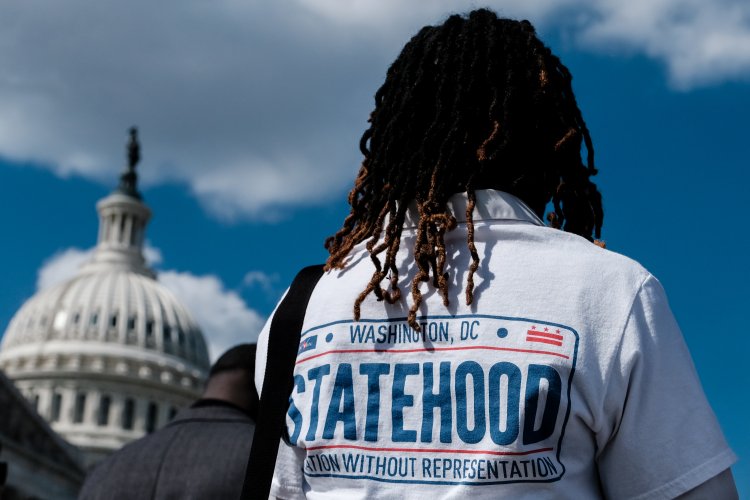DC Might Not Achieve Statehood, But It Could Be Incorporated into Maryland.
Washingtonians might be shocked by the idea of reestablishing ties with their northern neighbor, yet some believe it’s a better option than yielding to Trump.

Four years ago, the House of Representatives passed legislation to grant D.C. statehood, bringing the dream of civil rights activists closer to reality. In stark contrast, the current political climate sees the city reduced to pleading with Congress to access its own funds for budget balancing. Recently, Mayor Muriel Bowser detailed plans for severe budget cuts.
This humiliation is just the latest in a series of challenges. Since January, Trump has toyed with the idea of taking control of the district, while Republican lawmakers have attempted to dismantle the city's democratically elected government. In a bid to maintain a degree of local governance for its 700,000 residents, D.C. leaders have made concessions to the GOP, including actions like removing a Black Lives Matter mural and investigating graffiti as a hate crime.
Amid this turmoil, statehood discussions have become muted. Instead, a taboo topic has emerged: the potential retrocession of D.C. back to Maryland, a historical reversal of what occurred in the 1840s when part of the district rejoined Virginia. The area now known as Arlington and Alexandria enjoys full representation and is free from external interference on issues such as traffic laws and abortion rights.
For a long time, the idea of rejoining Maryland has been controversial among local advocates. Many believe that statehood is the only legitimate way to address the injustices faced by a historically marginalized city, along with securing additional Senate representation. However, the current political crisis has prompted even prominent D.C. statehood supporters to entertain retrocession, signaling a significant shift.
Maryland Democratic Representative Jamie Raskin, a D.C. native, recently expressed to Mayor Bowser that returning to Maryland could provide a safer environment than existing under "MAGA colonialism." Raskin's statement was striking, as it diverges from the established pro-statehood strategy.
Historically, retrocession has found favor mainly among Republicans who aimed to impede D.C.'s push for statehood, including hardliners like former Texas Representative Louie Gohmert. In 2021, South Dakota Republican Dusty Johnson introduced a retrocession proposal during a time when the Democratic-led House was considering statehood.
Raskin noted that while Mayor Bowser appeared to contemplate the proposition, her office reaffirmed support for D.C. statehood, reflecting the broader sentiment among local officials. D.C. Delegate Eleanor Holmes Norton spoke out against retrocession, asserting that it lacks support in both Maryland and D.C.
Despite Norton's stance, the retrocession concept could potentially alleviate the persistent budgeting issues by removing contentious national politics from local governance. Retrocession may even serve the daily needs of residents better than statehood might.
The focus should be on practicality rather than symbolism. Would one prefer to manage a small population's demands for a university system or judicial framework or merge with a larger state that already excels in these areas?
David Krucoff, a D.C. local and former GOP candidate, has long championed the idea of merging with Maryland. He believes that the resistance to this merger is rooted in the Democratic Party's fixation on achieving what they see as grand reforms, rather than practical solutions that could lead to improvement.
Krucoff argues that retrocession could provide efficiencies that would relieve D.C. residents from having to support a full range of state functions. "D.C. has about 90 agencies within its government, and most of them do functions that states do, as opposed to what cities do," he explained. By eliminating the need for extensive state-like operations, the District could save money while enhancing Maryland's economy by incorporating its affluent taxpayers.
Using 2022 data, Krucoff points out that D.C. has a per capita revenue of roughly $30,000, contrasted with Maryland's $14,000. While spending requirements would shift, D.C. remains an attractive addition for Maryland.
Krucoff envisions a streamlined federal district remaining around the National Mall, similar to how Virginia reclaimed portions of the District almost 180 years ago. A Congressional approval process would lead to local voter support and eventual integration into Maryland as Douglass County, named after the esteemed abolitionist.
There are, however, significant hurdles to overcome. Congress’s appetite for retrocession has diminished, particularly now that it may seem less necessary with a Republican trifecta in place. Maryland’s own political landscape further complicates matters, as both Republicans and some Democrats express concern that including D.C. would diminish their own power in the state.
Political mergers are infrequent due to the vested interests of those in power, including D.C. bureaucrats who might fear losing their jobs. Despite this resistance, Krocoff notes it could be beneficial for D.C. residents.
Acknowledging his feelings about merging with Maryland, even as a native D.C. resident, reflects the emotional ties to the concept. "Maybe we can get a special carve-out," Krucoff suggested light-heartedly, "We can get a tag that says 'Douglass County' or something." The initials would still read D.C.
Anna Muller for TROIB News
Find more stories on Business, Economy and Finance in TROIB business












